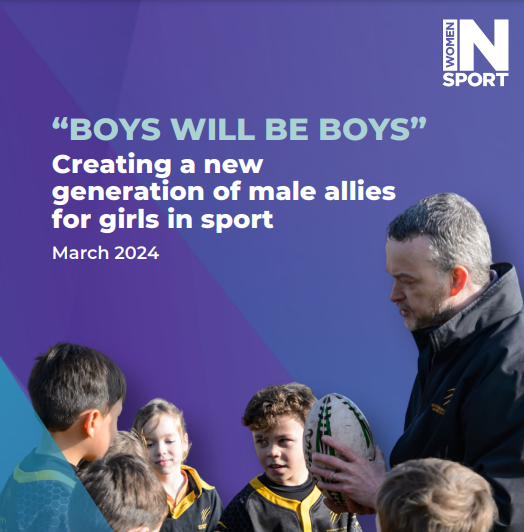
Women in Sport's new campaign focuses on boys to tackle gender stereotyping
March 8, 2024
A new study by UK charity Women in Sport has shed light on the pervasiveness of gender stereotypes, particularly as they play out in youth sports. The non-profit says that the study is the first in its 40-year history to focus solely on what shapes boys’ attitudes towards girls in sport. Researchers honed in on British boys aged 5-11, in a companion project to an earlier report which focused on girls. The findings highlight a troubling double trend: sexism in sport becomes entrenched as early as five, and it hurts and limits boys as much as it does girls.
Women in Sport CEO Stephanie Hilborne said, "We lead our boys to think that masculinity is dependent on being good at sport, being dominant and winning, and then we wonder why they exclude girls in the playground or don’t pass to them in football. It’s not inevitable that this happens and it’s not acceptable to let it continue. It's imperative that we undo these stereotypes and foster a culture of mutual respect and understanding.”
The research, which was carried out between February and September 2023, gives some of the most up-to-date insights into British childhood trends. The comprehensive mixed-method study combined the results of a survey of 2000 parents of children aged 5-11 and a qualitative ethnography of 20 families of young boys from a variety of backgrounds.

According to the findings, boys who are questioned directly typically claim to believe in girls’ sporting ability. Their actions, however, prove otherwise. Typically reluctant to involve girls in their sports activities, they are also consistently tougher with criticism towards girls. As one female PE teacher reported, “I have seen a girl in a team make a mistake and the boys being critical of her rather than supportive, which they would not necessarily do if another boy had made the error."
Sport-related attributes of speed, strength and agility were shown to be at the center of parental definitions of ‘boyishness’ and team participation expected by their teachers, parents and coaches alike. Likewise, the study found that boys were more likely to be encouraged to focus on winning at all costs, and less likely to be taught to process their disappointments after experiencing a defeat.
While the scarcity of women coaches and players in their school environment directly affects girls’ confidence in participating, the fact that very few boys were able to identify a woman athlete they looked up to also has a huge impact on stereotyping. In combination with the lack of sporting role models for girls, the result was consistently limited opportunities for boys and girls alike, since boys who did not identify with or enjoy sports were immediately made to feel insecure in their preferences. “I’d quite like to do dance, but none of my friends do it so I play football with them instead,” responded one primary school boy.
These kinds of behaviors are often so entrenched as natural that they’re not immediately visible, even to seasoned educators. “Until we started this research I didn’t really think that the boys were behaving any differently towards girls. Then I started to notice it,” responded one mixed team coach. “Since then I’ve started to change the way I coach to make it more equal for girls.”
In response to these findings, Women in Sport have released a new campaign: #WhatsYourLittleOneMadeOf. This initiative brings together a wealth of data-rich resources, aimed directly at those with the most influence on young children: parents, teachers and coaches. The campaign is promoted via a slick series of satirical videos, fronted by British social worker and comedian Isma Almas and actor Max Bowden to spark conversations and drive meaningful change.
“We are on a mission to disrupt the status quo and challenge the societal norms that perpetuate these harmful stereotypes,” says Hilborne. “By creating thought-provoking content, we aim to ignite conversations and drive meaningful change within sport and in society as a whole.”
Women in Sport's #WhatsYourLittleOneMadeOf campaign represents a proactive effort to challenge ingrained gender biases in sports and pave the way for a more inclusive future. By empowering boys to become allies for girls in sports and fostering environments that prioritize mutual respect, the campaign seeks to dismantle harmful stereotypes and create opportunities for all individuals to participate and thrive in sports.